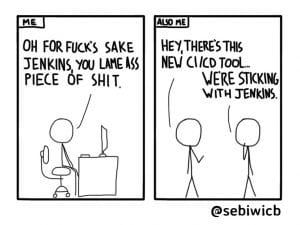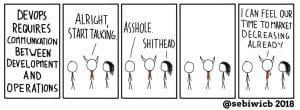Let’s talk about communication for a bit.
One of the most interesting roles I’ve had to fulfil the last couple of years has been the “Operations guy working as a part of a Development team”. This is a fascinating situation to find yourself in. Allow me to elaborate.
Historically, Operations teams have been isolated from Development teams. Two separate organizational entities. The reasons for this were manyfold: Operations people were a scarce resource, they needed to accommodate vast amounts of work for numerous Development teams (server provisioning for team A, middleware configuration for team B, application deployment for team C), it made sense for management to group people into teams using their skillset as sorting criteria... you name it. In the end, most interactions between Development teams and Operation teams happened through ticketing systems.

Effective communication
These workflows created and fueled most of the communication issues within organizations, and by doing so, created gargantuan bottlenecks on the development/deployment pipelines. Applications and services took months or even years to ship into production. This, needless to say, was frustrating for everyone involved in the process. It also had a huge impact on Time to Market. No one was happy.
While these situations still occur nowadays, the incorporation of Agile approaches into Software Development is becoming increasingly common, and its impact on Operations is clearly visible from an organisational point of view. It is not rare, for example, to see Feature Teams within an organization. These are cross-functional, which means that they tend to incorporate many different profiles into their ranks. From conception, design, and implementation, up to deployment, product owners and designers will be working hand in hand with developers. This most likely means that an OPS will also be a part of the team.
When working as an OPS in a Development, Feature or Product team, most of your responsibilities will shift, whether you realize it or not. It will not be about taking team X’s artifact and deploying it on servers A, B and C anymore. It is your team now, and therefore, your artifact and your servers. You will most likely have to deal with a lot of things you are not used to dealing with.
This is a good thing. Embrace it.
It is an opportunity. If you do things right, you will be able to:
Under this light, the role of an OPS inside a development team is virtually Tech Leading, focusing on operational aspects. In short, it’s mostly about soft skills (even though technical skills are still required), about the ability to express ideas, vulgarize subjects, solve issues, analyze and solve problems, and share knowledge with your team. That’s a tremendous change. And the basic ingredient for all of these is kindness.
When working on an organizational setup like this, there is a high chance that you will be the most technical person on the team. When I say technical, I mean with the biggest background on Linux/Windows systems, middleware, networks and virtualisation. If not, that’s great news. It means that you will have people with whom you will be able to discuss all of these subjects. Someone who will be able to challenge you, or remind you what’s important when you’re having tunnel vision. In any case, you will most likely have to propose solutions to many different issues.
At some point you will have to deploy your application and its dependencies somewhere. That’s where your knowledge on the subject comes in. Web servers, application servers, reverse proxies, caching systems, databases, failover, high availability, disaster recovery... These are all things you will have to analyze. Should you use nginx or Apache? PostgreSQL or MySQL? The answer is always the same: it all depends on your needs. Try to analyze what you need before proposing a solution. Leverage your experience when doing so.
Be cautious: this does not mean that you need to make all of these decisions all by yourself. There are trade-offs for every single choice you will make. These trade-offs will not only impact the functioning of the application itself, but also its development. This means that their opinion on the matter is paramount. Your role is to explain the different options to the people that are concerned by the choice. Remember, consensus is key. Embrace challenge too. For good ideas, you need human interaction, healthy conflicts, argument and debate. When doing so, remember to be kind. Don’t impose your opinions on everyone else. Be constructive. And this is not specific for this section. There should be an acronym for this, RTBK. It should be used way more often than RTFM.
This also applies to Continuous Integration and Continuous Deployment. What is the simplest workflow in order to take the application’s source code, shape it into the actual application and make it accessible to users? This has tremendous value: it will allow you to automate time-consuming, repetitive tasks, creating a safe automated pipeline, which will in turn allow everyone to concentrate on delivering value. A piece of advice: start small, and work your way up to something that suits your needs. “Simple is better” should be your mantra. Once again, apply the knowledge acquired from previous experiences when doing so.

Improve, based on your experiences
More often than not, people on your team will have questions regarding your field of expertise. Discussions will be held on subjects you know in depth. A lot of terms will be thrown around: availability, redundancy, stress testing, building and deployment. Once again, if they know everything there is to know about these subjects, that’s a good thing too. Either way, you might want to step in and catalyze the discussion.

Individuals and interactions over processes and tools
Before doing so, remember to be kind. It is a key aspect in human interaction, and it will encourage participation, collaboration, and innovation.
First off, explain the meaning of every concept being discussed to everyone. It is crucial for every single person on the team to share the same language in order to have effective interactions. When having discussions about the “bastion”, one person may be talking about the web interface of a Cloud provider, whereas another one might be talking about a Linux server.
Be clear with your communication. More specifically, work on your vulgarization. I can’t stress this enough. The ability to express complex concepts in a simple fashion is priceless. It’s one of the most valuable skills you can learn. They don’t necessarily need to know every single detail on the subject. It is not the same, saying “there was a problem with the application’s configuration” than “the application crashed because we forgot to set the heap’s maximum size”. A fundamental part of the vulgarization exercise is to be capable of discerning the appropriate level of technical depth for each person.
Sometimes, these discussions will start to consume the time allocated for other purposes: stand up meetings, retrospectives, backlog grooming or others. While it’s good to be able to facilitate these discussions, it is also important to find the right instances to do so. If they do not exist, you can propose new ones yourself. Or even better, just make yourself available in order to discuss these subjects. Individuals and interactions over processes and tools.
A large amount of people see Operations as an impenetrable affair. It is safe to say that it is a hard topic to grasp. This is mainly due to the huge amount of subjects it covers. Operations entails development, systems administration, networks and security, just to name a few. This may sound intimidating to most newcomers.
Nevertheless, this does not mean that they are not interested. They are often just scared of the unknown. Once people see that you are approachable, they will start asking questions. Even if they don’t, you should ask them if there are things that they want to learn. If things go right, you’ll get the opportunity to share your knowledge.
Before even thinking about doing so: RTBK. If you don’t know what this means, you’re skipping important parts of this article. Don’t. Go back, and take the time to read them.
There are two fundamental reasons to share your knowledge. First, mentoring people is one of the most interesting and rewarding things you can do. Motivated people have tremendous potential, and if they are willing to learn and are interested in what you do, you can catalyze their growth to a great extent. Sometimes it only takes a little push for someone to discover a great deal of capabilities. You just need to know how to give the right push, in the right direction.
Second, it allows you to spread the knowledge. If you’re the only person working on these subjects, you will most likely become a single point of failure. If something happens to what you built when you are not available to fix it, the whole system goes down. It is reasonable to want to share that responsibility with someone. Do not expect them to become fully autonomous, or a plug in replacement for you right away, they are already doing something else as a full-time job. Still, having enough knowledge to be able to debug common issues is already great.

Fullstack DevOps engineer
The most efficient form of knowledge sharing is pair programming. It is fundamental that everything that is going on is completely understood. You can’t expect people to pick up Infrastructure as Code without having any knowledge on Linux systems, for example. This is not necessarily an issue, as you can teach them as you go. Make sure they understand what’s going on, and do it often. Ask them to reformulate what you just said: drawing things works great for this purpose.
This is probably going to be a good exercise for you as well. Explaining a concept to someone forces you to structure it differently in your head, and it will allow you to know if you fully understand it too. If you do not, you can look up the answer together. This is not a problem. More on this in the next section.
Later on, you can give them tasks you would normally work on by yourself. When doing this, the most important part is to be able to select the right amount of work, with the right complexity. It must be challenging enough for them to feel excited, and not hard enough to make them frustrated. Aim for balance.
You can also use other formats in order to teach large groups of people at the same time. Mob programming works great too, or code katas, if you have interesting subjects you can share. You can teach them how to code their own wrappers using Test-Driven Development, how to test their infrastructure code, or how to leverage monitoring or reporting tools in order to understand what’s going on within your system.
Last but not least, you should contribute to the continuous improvement of the team. When doing so, remember to be kind. Make sure everyone on the team knows how important this is. It is a must-have quality when trying to improve as a whole, when proposing enhancements and giving feedback. Change your formulations, switch from “you made a mistake” to “we made a mistake”, it will help you stay away from finger pointing. Responsibilities should be collective.
It’s hard to be specific on this topic, since areas of improvement will vary from team to team. I’ll give it a try though.
At first, most people will refer to you as the DevOps of the team. Explain them that DevOps is not a role, but a culture of collaboration and communication. It should be a goal you should all aim for.
Fail, and fail fast, too. Champion innovation, testing new ideas, validating them, and cope with the fact that sometimes they don’t work. It’s a good thing, as long as you know when to seek an alternative, and you get to learn something.
Work on quality. Start doing code reviews, for example, if you are not doing them already, and include infrastructure code as well. They are most important when trying to see what people are doing, to correct or improve certain practices, and to share the code. Have them read your code too. At first they will be scared, and they will tell you that they don’t want to because they won’t have any remarks or contributions. This is not true. They will read it, and understand how it works. If they don’t, they can come over and ask for clarifications. No single points of failure.
Measure everything. Preach the importance of monitoring and observability. Let them know how to work on code instrumentation for it to be easily observable. Show them the benefits of having structured, clear logs, and being able to query the platform to have immediate answers on what is going on, at any time. They’ll be onboard as soon as you show them the advantages.
Lead by example. Motivate them, code with them, show them that you can do the same things you do in standard development when you’re doing Operations. Show them Clean Code, Test-Driven Development and refactoring, applied to infrastructure code.
Learn from errors and mistakes. If you have a production incident, analyze the root cause so that you can learn from it, and prevent it in the future. Asking yourself five times why something happened is a great way of finding root causes. You will often see that what you thought was a technical issue actually has an organizational or design root cause.
Say “I don’t know”, when you don’t know. You are not meant to know everything. Not knowing is not an issue. It is impossible to know everything. It is a good thing to say it. Be honest. People will trust you more, and start doing it themselves too.

“I don’t know”. Say it.
You don’t have to. It all comes down to six basic principles:
And most importantly, have fun. If it’s not fun, it’s probably not worth it.